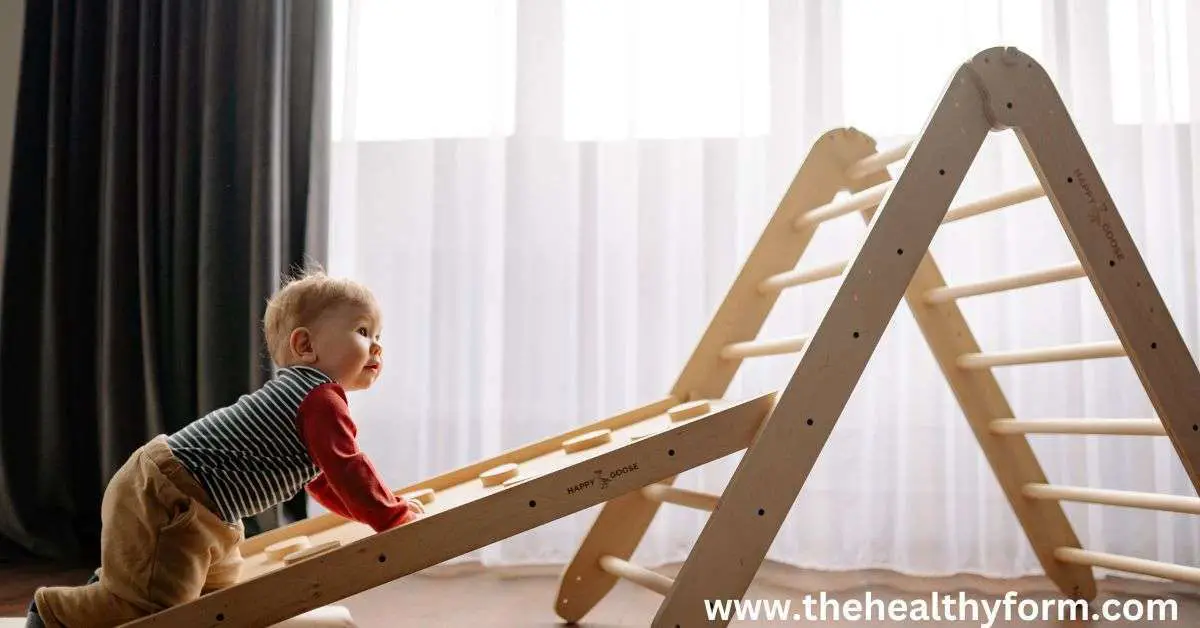10 Essential Baby Care Tips for New Parents
Get expert advice on caring for your newborn baby. Learn essential baby care tips for new parents, including feeding, sleep, safety, and development. Gain confidence and peace of mind as you navigate parenthood. Caring for a newborn can be thrilling and overwhelming for a new parent. There is much to learn and think about, from baby gear and development milestones to feeding and sleep regimens. This is to guide you through this exciting yet occasionally overwhelming time.
For new parents, we’ve produced a list of 10 tips for baby care. These recommendations address many topics, including comprehending and setting a routine and a secure sleeping environment. Baby growth and looking out for assistance and guidance. Regardless of whether you’re a first-time parent or are expanding your family. You can provide your child with the most excellent care possible with the help of these suggestions.

Baby Care Tips 1: Establish a routine
A routine can benefit newborn care by providing structure and predictability for you and your baby. Performance can help with feeding, sleeping, and diaper changes, making it more accessible. A routine can also help your baby feel more secure and comfortable, giving them a sense of familiarity and stability.
Here are some baby care tips for new parents to create a routine for their newborn:
- Start with a feeding schedule. Newborns typically need to eat every 2-3 hours. Establishing a feeding schedule can be an excellent place to start. Consider the best times for you and your baby, and try to stick to them as closely as possible.
- In addition to feeding, you can also include activities like diaper changes, playtime, and sleep in your routine. Try these activities at the exact times each day to help establish a consistent pattern.
- While having a routine is essential, it’s also important to be flexible. Newborns are unpredictable, and things like growth spurts, illness, or changes in sleep patterns can throw off your routine. Be prepared to adjust your way as needed to accommodate your baby’s needs.
- Caring for a newborn can be exhausting, especially if you do it alone. Don’t be afraid to ask for help from your partner, family, or friends. Having someone to share the workload can make a big difference and help you maintain a consistent routine.
Baby Care Tips 2: Follow a safe sleep plan
You must provide a secure sleeping environment for your baby’s health and well-being. Sudden infant death syndrome is less likely in infants who sleep on their backs (SIDS). The most important thing is ensuring your kid sleeps in a safe atmosphere. Here are some baby care tips for new parents to make their baby’s bedroom safe:
- When placing your baby down to sleep, always put them on their back. This position is the safest and can help reduce the risk of SIDS.
- Use firm, flat surfaces, such as a crib or bassinet, for your baby to sleep on. Avoid using soft surfaces, such as pillows or blankets, as they can increase the risk of SIDS.
- To prevent your baby from getting tangled or suffocating, keep the sleeping area free of clutter, such as toys or stuffed animals.
- The room should be kept at a comfortable temperature, neither too hot nor too cold. Overheating has been linked to an increased risk of SIDS, so keeping the room at a comfortable temperature for your baby is essential.
- Instead of using loose blankets, consider using a safe sleep sack to keep your baby warm. Sleep sacks are safer than blankets, as they can’t be kicked off or cover your baby’s face.
- A white noise machine can help drown out household noises and create a peaceful sleeping environment for your baby. Just be sure to keep the volume low and at a safe distance from your baby.
- Exposure to tobacco smoke can increase the risk of SIDS. To keep your baby safe, avoid smoking or using tobacco products around them.
By following these tips, you can create a safe and comfortable sleep environment for your baby, helping to reduce the risk of SIDS and other sleep-related dangers.
Baby Care Tips 3: Practice good hygiene
Maintaining good hygiene is essential in newborn care, as it helps keep your baby healthy and free from illness. Proper hygiene can also help prevent the spread of germs and infections to other family members.
Here are some tips for maintaining good hygiene with a newborn:
- Please wash your hands frequently: It’s essential to wash your hands frequently when caring for a newborn, especially before handling their food or touching their face or mouth. Use soap and water and scrub your hands for at least 20 seconds.
- Keep your baby clean: Keep them clean by giving them regular baths and changing their diapers often. Use mild soap and warm water to bathe your baby and thoroughly dry them afterwards.
- Clean their pacifier and bottle nipples: If you’re using a pacifier or bottle, it’s essential to clean them frequently to prevent the build-up of bacteria. Use hot water and soap to wash the pacifier and bottle nipples, and rinse them well.
- Keep the house clean: To prevent the spread of germs, it’s essential to keep your home clean and free of clutter. Wipe down surfaces and toys with a disinfectant, and consider using a humidifier to keep the air moist and help prevent the spread of illness.
- Get vaccinated: To help protect your baby from illness, you and other family members must get vaccinated. Talk to your doctor about which vaccines are recommended for you and your family.
These tips help maintain good hygiene and keep your baby healthy and ill-free.
Baby Care Tips 4: Follow a feeding schedule
Establishing a feeding schedule is essential for newborn care, as it helps ensure your baby gets the nutrients they need to grow and thrive. A feeding schedule can also help you keep track of your baby’s intake and know when to expect feedings.
Here are some baby care tips for new parents to create a feeding schedule for their newborn:
- Feed your baby every 2-3 hours: Newborns typically need to eat every 2-3 hours, so aim to feed your baby on this schedule. This may mean getting up at night for feedings, but it’s essential for your baby’s growth and development.
- Pay attention to your baby’s hunger cues: While it’s essential to stick to a feeding schedule, it’s also important to pay attention to your baby’s hunger cues. If your baby seems hungry before the scheduled feeding, don’t wait to feed them.
- Offer both breasts: If breastfeeding, offering both breasts during each feeding is essential. This helps ensure that your baby is getting enough milk and helps stimulate your milk production.
- Keep track of your baby’s intake: It’s essential.
Baby Care Tips 5: Make sure your baby is safe at all times
Baby safety is a top priority for all parents, and there are many things to consider when keeping your baby safe. From car seats and cribs to household hazards and toxic products, it’s essential to be vigilant and protect your little one.
Here are some baby care tips for new parents to keep their baby safe:
- Use car seats and restraints properly: It’s important to use car seats and controls to keep your baby safe while travelling. Make sure to read the instructions carefully and follow all guidelines for installation and use.
- Keep an eye on your baby at all times: It’s essential to keep a close eye on them, especially when small. Make sure to leave your baby unattended, even for a short period.
- Use safety gates and locks: Use safety gates and locks to prevent your baby from accessing areas of the house that may be dangerous, such as the kitchen or stairs.
- Keep toxic products out of reach: Keep poisonous products, such as cleaning supplies and medications, out of your baby’s reach. Always store them in a locked cabinet or out of reach of curious little hands.
- Avoid exposing your baby to hazards: Be mindful of risks in your home and take steps to prevent your baby from coming into contact with them. For example, keep electrical cords out of reach, cover sharp edges, and keep small objects out of reach.
These tips can help ensure your baby is safe and reduce the risk of accidents and injuries.

Baby Care Tips 6: Understand baby development milestones
Understanding baby development milestones is integral to newborn care, as it helps you track your baby’s progress and know what to expect as they grow. Knowing what landmarks to look for can help you identify potential developmental delays and get the needed support and resources.
Here are some baby care tips for new parents to help their baby reach milestones:
- Learn about typical milestones: It’s essential to familiarize yourself with specific baby development milestones to know what to expect as your baby grows. You can find information about milestones online or by talking to your pediatrician.
- Encourage your baby to explore: Help them reach milestones by encouraging them to explore and interact with their environment. This can include tummy time, playing with toys, and reading to them.
- Provide opportunities for physical activity: Physical activity is essential for your baby’s development, so provide plenty of options for them to move and explore. This can include crawling, walking, and playing with toys to encourage movement.
- Encourage language development: Encourage your baby’s language development by talking to them and reading regularly. Respond to their babbles and coos, and use simple words and phrases when speaking to them.
- Seek help if you have concerns: If you have concerns about your baby’s development or any delays, don’t hesitate to seek help. Your pediatrician can provide guidance and refer you to appropriate resources if needed.
By understanding baby development milestones and providing your baby with the support and opportunities they need, you can help them reach their full potential.
Baby Care Tips 7: Invest in essential baby gear
Having the right baby gear can make a big difference in your daily routine as a new parent. From strollers and car seats to diapers and bottles, there are many items that you’ll need to care for your newborn. While it can be tempting to go all out and buy everything under the sun, it’s important to focus on the essentials and invest in high-quality gear that will last.
Here is a list of essential baby gear for new parents:
- Crib: A crib is a must-have for any newborn. Look for a crib that meets current safety standards and has adjustable height settings to make it easier to reach your baby.
- Car seat: A car seat is essential for keeping your baby safe while traveling. Make sure to choose a car seat appropriate for your baby’s age and weight, and follow all instructions for installation and use.
- Stroller: A stroller is a handy gear for getting out and about with your baby. Look for a lightweight stroller that is easy to maneuver and suitable for your baby’s age and weight.
- Diapers: You’ll go through many diapers in the first few months, so having a good supply is essential. Consider using disposable or cloth diapers, depending on your preference and budget.
Baby Care Tips 8: Take care of your health
As a new parent, it’s easy to get caught up in the demands of caring for your newborn and neglect your health. However, it’s important to remember that taking care of your health is essential for your well-being and your ability to care for your baby.
Here are some baby care tips for new parents to take care of their health as a new parent:
- Get enough sleep: Getting enough sleep is crucial for your physical and mental health. As a new parent, it can be challenging to get enough sleep, but it’s important to prioritize it and find ways to get some rest whenever possible.
- Eat a healthy diet: A healthy diet can help you stay energized and focused, essential during the postpartum period. Get enough protein, fruits, and vegetables, and stay hydrated.
- Exercise regularly: Exercise can help boost your energy levels and improve your mood, and it’s essential to find ways to incorporate it into your routine as a new parent. Even a few minutes of exercise daily can make a big difference.
- Seek support: Caring for a newborn can be overwhelming; seeking consent when needed is essential. Don’t be afraid to ask for help from friends, family, or a professional caregiver.
- Take breaks: It’s okay to take breaks and give yourself a little time to rest and recharge. Please don’t feel guilty about taking time for yourself, as it can help you be a better parent in the long run.
By taking care of your health, you can be better equipped to care for your newborn and meet the demands of parenting.

Baby Care Tips 9: Know what to do in an emergency
As a new parent, you must be prepared for emergencies and know what to do in an emergency with your newborn. While it’s natural to hope that nothing will go wrong, it’s better to be safe than sorry and have a plan.
Here are some tips for handling emergencies with a newborn:
- Keep a first aid kit handy: Make sure you have a well-stocked first aid kit and know how to use the items in it. Your kit should include sterile gauze, adhesive bandages, scissors, and tweezers.
- Know CPR: Knowing CPR can be a lifesaver in an emergency. Consider taking a CPR class to learn how to perform CPR on an infant.
- Know your emergency phone numbers: Keep a list handy, including the number for your pediatrician, the poison control center, and the local emergency services.
- Know how to handle everyday emergencies: Familiarize yourself with how to handle common emergencies, such as choking, bleeding, and burns.
- Keep your baby’s medical records up to date: Keep them up-to-date, including their vaccination records and any allergies or medical conditions. This can be important in case of an emergency.
By being prepared and knowing what to do in an emergency, you can help protect your newborn and keep them safe.
Baby Care Tips 10: Seek out support and advice
As a new parent, it’s natural to have questions and concerns. Having a support system and access to reliable advice can help navigate the challenges of newborn care.
Here are some tips for finding support and advice as a new parent:
- Talk to your pediatrician: Your pediatrician is an excellent source of advice and support when caring for your newborn. Don’t hesitate to ask them any questions you may have about your baby’s health or development.
- Join a parenting group: Whether in-person or online, joining a parenting group can be a great way to connect with other parents and get support and advice. You can find groups through local parenting organizations, social media, or online parenting forums.
- Seek out resources: Many resources are available to new parents, including books, websites, and blogs that can provide helpful information and advice. Look for resources that are reliable and evidence-based.
- Don’t be afraid to ask for help: Don’t be scared to ask for help when needed. Whether it’s from friends, family, or a professional caregiver, it’s essential to have a support system to help you through parenting challenges.
- Take care of yourself: Remember to care for yourself and your newborn. Seek support and advice for your well-being through self-care practices, therapy, or other means.
Seek support and advice to improve parenting skills and handle newborn challenges.
FAQ about Baby Care Tips for New Parents
Some of the most common questions people have about baby care tips for new parents are:
How often should I feed my newborn baby?
Newborns typically need to be fed every 2-3 hours or on-demand when they show signs of hunger.
How do I know if my baby gets enough breast milk or formula?
You can monitor your baby’s weight gain, diaper output, and overall behavior to ensure they are getting enough nutrition.
How should I bathe my baby?
You can give your baby a sponge bath until their umbilical cord stump falls off, and then transition to a shallow bath with mild soap and warm water.
How can I soothe my fussy baby?
Swaddling, rocking, singing, and white noise can all help soothe a fussy baby. It’s also important to rule out any underlying medical issues.
When should I start sleep training my baby?
Sleep training can begin around 4-6 months of age, but it’s important to consult with your pediatrician and find a method that works for your family.
How do I prevent diaper rash?
Regular diaper changes, gentle cleaning with water and mild soap, and applying a barrier cream can all help prevent diaper rash.
How can I encourage my baby’s development?
Providing a safe and stimulating environment, engaging in tummy time, reading to your baby, and offering age-appropriate toys and activities can all encourage your baby’s development.
When should I introduce solid foods to my baby?
Most babies are ready for solid foods around six months of age. Still, it’s important to consult your pediatrician and watch for signs of readiness, such as sitting up, showing interest in food, and losing the tongue-thrust reflex.
Conclusion
As a new parent, having questions and concerns about caring for your newborn is natural. To help you navigate this exciting and sometimes overwhelming time. Here is a recap of the ten essential baby care tips for new parents:
As a new parent, it’s important to remember that you are doing your best. You can, and it’s okay to ask for help when needed. Caring for a newborn can be challenging, but it’s also an enriching experience. Trust yourself and your instincts, and remember that every parent makes mistakes.




